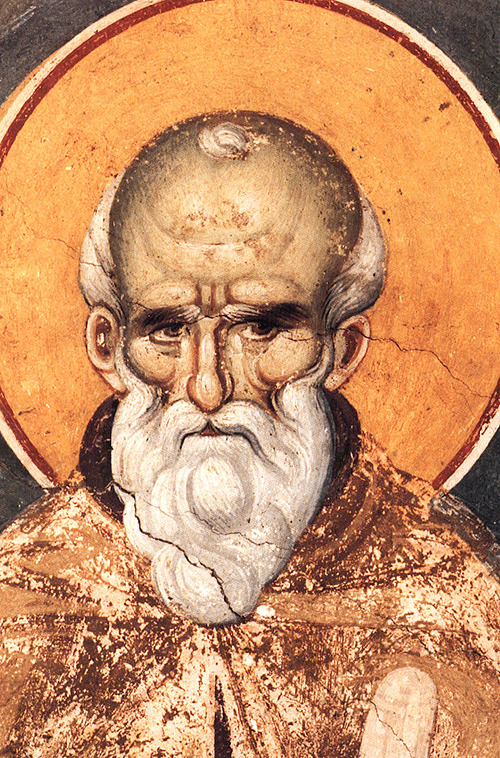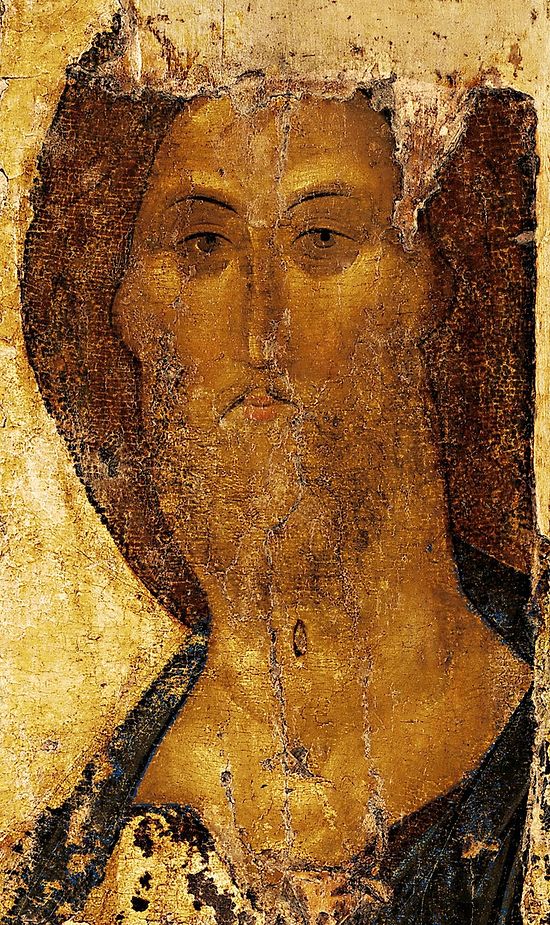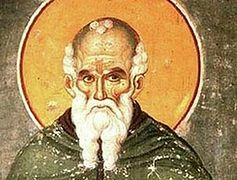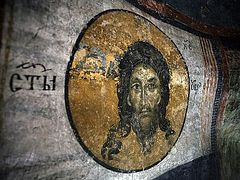
The soteriological need for reciprocity
Carlyle's mother may have hit the nail only halfway on the head. In that memorable quotation in which she rebukes young Thomas' claim that as a preacher he would simply tell his parishioners to go out and do what they knew they ought, hers was the memorable question: 'Would you tell them how?' Yet perhaps her comment would have been even more full had she brought into play another feature of discussion that her son seems to have left out: the crucial question of why. To know the what and the how of an issue are essential requirements for an accurate knowledge of its character, but without a grasp of the why which underlies them, the meaningfulness of such an issue cannot be fully grasped.
The question of 'why?' is at the centre of our current discussion on Maximos the Confessor. It is of peculiar note that the body of modern scholarship on Maximos, thorough and insightful though it is in many respects, seems to deal very little with this very question. Even such a masterful and monumental work as Lars Thunberg's Microcosm and Mediator, perhaps the most complete exposition of the Confessor's thought, tends to focus principally on the technical 'how' of his theology and anthropology. Without wishing to discount the great importance and insight of such studies, our concern in this short paper is not so much the technical explanation of Maximos' understanding of Christ's free will, as it is the theological motivations which pushed him to give such importance to this doctrine.
The lack of attention paid to the question of why cannot be blamed wholly upon modern scholars. Indeed, the case seems to be that our author himself spoke much less of it than he did of the doctrine's technical exposition. Maximos spends much time and spills much ink in defence of the two wills of Christ and His ultimate freedom of will, and he does a remarkable job of 'proving' them logically and philosophically. He spends much less time speaking of the theological background which was to give these concepts their pronounced importance. This unbalanced emphasis is in fact logical enough, given the circumstances surrounding the monothelete controversy with which Maximos was faced: it was not the notion of salvation that was being questioned, but rather the ontological and theological possibility of a single person (Christ) possessing a duality of will. It was a controversy over the how, and thus it is reasonable and expected that Maximos would devote the majority of his work to dealing with this very question. Yet in the present day, with the monothelete controversy long passed and the dythelete position having been accepted as a basic tenet of orthodoxy, the question of why this idea was of such central importance to so important a figure as Maximos becomes of heightened interest.
It is precisely because the Confessor presents us with a remarkable insight into this very question, that he has remained so influential a theologian throughout Christian history. For buried deep within his many layers of technical investigation lies a concept of salvation that has its heart in a true soteriology. This soteriological heart is, for Maximos, the notion of reciprocity, of mutual exchange and interaction in the process of human salvation—a notion that by no means finds its first patristic expression in Maximos, but which finds in him perhaps the most poignant presentation and emphasis of the theme in the early Church. It was Maximos' investigations into and clarifications of this relational concept of salvation in Christ that was to link his name so closely to the topic throughout the centuries to follow.
The Reciprocal Nature of Salvation in the Incarnation.
One may begin with a rather lengthy, but extremely important, quote from Lars Thunberg's shorter work on the Confessor, Man and the Cosmos:
As in the Eastern tradition in general, Maximus puts strong stress on the Incarnation as an effective instrument of salvation, of which—at least from one point of view—the reconciling death is only a logical consequence. Thus the different aspects are complementary; the sacrificial aspect occupies no exclusive place. The incarnation itself is the supreme act of divine grace, which manifests and carries into effect the salvific relationship between God and man. But stating this, we must always remember that incarnation has to be understood in terms of the doctrine of Chalcedon. This means that incarnation does not only imply God's becoming flesh, generally speaking, but God's becoming flesh in uniting himself hypostatically with man in Christ, true God and true man, fully united but without change or fusion. In other words, incarnation is always understood by Maximus as an aspect of reciprocity. The act of salvation understood in this way is not a one-sided act so that God, as it were, "forces" His salvation on man. Nor is it a divided act so that Christ as man reconciles God the wrathful Father, as in the predominant Western tradition, but a cooperative act, an act of reciprocity, a concerted act, and it has to be understood in this way.[1]
One finds in this remarkable paragraph the heart of Maximos' understanding of the relational aspect of salvation. He is unwilling to look at it as a one-sided act on the part of God, somehow forced upon man from above. Promulgation of such a notion of 'forced salvation' would be to lose sight of the fact that man freely fell, a concept of which Maximos often spoke. The Fall was the work of humanity, stemming from the free choice with which it had been endowed as an aspect of its creation in the image of God. The first sin was, as all wilful choices are, the free choice of a free creature. To Maximos, such a reality intimately tied the will and the Fall together: the latter was bound up in the former, was indeed caused by it. Thus a salvation could not simply be a redemption of body or even of mind as a purely intellectual agent. It must needs be a salvation of will, for this is the element of most severe corruption in fallen humanity.
Thus the question logically becomes, 'what is Maximos' conception of human will?', and it is to this question that one must turn before an examination into the Confessor's conception of the human will in the person of Christ can be attempted.
A. Human Will: logos and tropos
Andrew Louth has perceptively written, 'For Maximus, what is distinctive about being human is self-determination'.[2] It is humanity's ability to make self-determined choices that sets it apart from other beings in the created order and makes it unique. It is at the very heart of the image of God which man bears. Yet, as we have noted above, this free, self-determining will is also at the heart of humanity's fallen state. Somehow, as experience and Scripture reveal, the human will, created good and whole, is now found corrupted in the life of man. The question which faced Maximos' generation was how such a corruption of that which God had created was possible.
To address this issue, Maximos came to distinguish between two aspects of the human will: the natural and the personal. The first, the natural will, is that which is the creation of God and resides in each creature as an aspect of its very essence. It is the Creator's own handiwork, an essential part of creation itself, and resides as part of the very nature of a created being. As F-M Léthel writes:
Chaque nature diffère essentiellement de toute autre nature par son logos propre qui lui assure une consistance inaltérable ; l'immutabilité des logoi est fondée en Dieu.[3]
Léthel's use of logos to describe the natural will is borrowed from Maximos himself. This is the 'essential element' of human will: that which, by essence, makes the will human and not the will of some other created being.
Yet the natural aspect of the will cannot be considered apart from its human realisation, the personal aspect, or, in Maximos' terminology, the tropos. While the logos will is essential to human nature, and thus the same throughout the whole of humanity, the possession of individuality brings it to bear in differing ways. Indeed, personal choices are as individual as human beings are as people. Thus, reflected Maximos, while all share a common human natural will, each person appropriates it individually. The way (or 'mode', tropos) in which one wills is specific to each person uniquely; or, otherwise phrased, it is a unique mode of his personal hypostasis.[4] It is the very self-determination of which Louth speaks as a foundational element of human character.
This distinction between a logos and a tropos aspect within the will is, as Léthel terms it, 'une des clefs de la Christologie de Maxime'.[5] Indeed, it offers one of his most profound insights into human nature. There is a will that is the creation of God, and thus is beyond the power of humanity to alter or corrupt. The logos is beyond human influence, not because that influence is false or unreal, but because the creation of God cannot be corrupted or thwarted by humanity. Yet the tropos, or the way in which one makes use of his logos will, either by approximating or abandoning it, is wholly within each person's individual power as a unique, subsisting hypostasis.
The elaboration of this notion of tropos led Maximos to a term with which he is now often associated: gnomi, or inclination. Each personal hypostasis, in freely choosing from the apparent goods before it as an expression of its own tropos, suffers from certain inclinations as to which choice it might make. Ideally, the personal tropos would always freely choose that which was in actuality the proper good, that which is in alignment with the logos and thus with the will of God. But the result of the Fall has been an effective corruption of the perception of this good: humanity is not always able to truly see its own logos, and thus the true good which it ought to choose. The result is the gnomi, or the personal approximation to the good that an individual makes via his or her inclinations. Thunberg writes:
Gnomi—a favourite term of Maximus—does not denote an act of the will, but a disposition or habitus of will, such as man as individual and as fallen creature may establish for himself.[6]
This concept of gnomi linked to tropos offers an insightful picture of Maximos' conception of humanity as fallen creature: the fundamental nature of the human will, he thought, was not effected by this cosmic event. Rather it was the misuse of the tropos and its eventual influence into the development of a deficient gnomi. Again, Léthel:
{Ainsi, entre l'humain dans le Christ et l'humain en nous, il ne peut pas y avoir une différence de nature.} La différence, qui consiste en la contrariété de volonté qui est en nous et qui n'est pas en lui n'est pas de l'ordre de la nature; bien plus, cette contrariété est «contre nature», véritable déprivation de la nature.[7]
It is this 'deprivation of nature' that is the great sin of the human will: that it no longer sees or identifies with its own essence, its logos, and thus no longer knows its true good. The 'gnomic compensation' is a far cry from perfection, yet it is, for Maximos, the true lot of fallen humanity.
B. The Human Will in the Person of Christ.
The above quotation from Léthel leads naturally into a discussion of the human will in Christ, to which we may now turn. Certain logical results stem from Maximos' understanding of will, as discussed above. First, the linking of the logos with the essence of a being thus inextricably links it with that being's very nature. It therefore naturally follows that Christ would have two such wills, as it was affirmed at Chalcedon that He had two distinct natures. Maximos here had a firm conciliar stance upon which to promote a dythelete understanding of Christ. It must also logically follow, given the Confessor's discussion of the universal character of the human logos across all humanity, that the human will of Christ must be the same as the human will in humanity. There is one essential human nature, shared by all despite their individual tropoi of expression, and it is in this same nature that Christ, as man, must share. There is, however, a fundamental difference between the human will actualised by Christ and that actualised in the rest of humankind:
In the Incarnate One there are two natural wills, because there are two natures (and two activities). But there is no gnomic will in Christ [...] for there is no deprivation of knowledge of the good.[8]
The importance of this concept in the Christological understanding of the Confessor cannot be overstated. Christ, as fully human, did fully possess the natural human will. Yet the uniqueness of His personal hypostasis—that of the incarnate Word by which He was also fully divine—allowed Him to overcome the human disposition (gnomi) toward sin. The 'deprivation of knowledge of the good,' inherent in the fallen human condition, was overcome in the person of Christ. In other words, Christ possessed the full logos of human will, but not the gnomi that is the result of the misused and misguided tropos. This notion allowed such a one as Gauthier to say that Maximus was able 'to establish two complementary truths, that, for the one part, Christ possessed a human will, and that for the other part, He did not possess a peccable will'.[9] Léthel elaborates further:
De point de vue de logos de la nature, la volonté humaine est la même dans le Christ et en nous : en lui comme en nous, il y a un «vouloir naturel». La différence réside dans le tropos hypostatique que saint Maxime exprime en disant que le vouloir humain de Jésus est «marqué divinement, d'une façon supérieure à nous».[10]
Christ's unique hypostasis as the eternal Word, and the essential 'union without confusion' of His divine and human natures, allowed for His tropos to be perfectly aligned with His human logos. Thus He possessed a natural freedom of will, as does all humanity, yet for Christ this was actualised within the fully deified person.
Back to the 'Why?'
We may now return to the question Carlyle's mother didn't ask: why was this notion of the free human will in Christ of such importance to Maximos? To obtain an answer, one may turn again to the quotation with which this discussion was opened. Of particular importance are the following few sentences:
Incarnation is always understood by Maximus as an aspect of reciprocity. The act of salvation understood in this way is not a one-sided act so that God, as it were, "forces" His salvation on man. Nor is it a divided act so that Christ as man reconciles God the wrathful Father, as in the predominant Western tradition, but a cooperative act, an act of reciprocity, a concerted act, and it has to be understood in this way.[11]
When earlier commenting on this conception of salvation, we noted that Maximos viewed the Fall as, largely, an act of human will. This has now been elaborated by the above investigation of his conception of will itself. The Fall was originally wrought by the misuse of will among humanity, and thus was the result of free choice; it was not the working of God, but the mis-working of man. This provided the framework for what Maximos' saw as a future of relationship between man and God in the area of salvation: it was something that only God could effect (here Maximos is in line with Athanasius), yet it had to be something that humanity freely chose. Salvation could not be 'forced', for this would not involve the redemption and sanctification of the very thing that Maximos' saw at the root of humanity's fallen state: the human will.
Salvation, then, must involve two fundamental elements: (1) the saving power of God the Creator, who is the only source of life, and thus the only one capable of restoring life to those who have lost it; and (2) the free consent of the human will to the divine plan of redemption. Only when man uses his free will to re-attain his proper logos, can salvation and sanctification fully come to pass. And this is the heart of the great why behind the Confessor's emphasis upon the free will of Christ: only if Christ possessed a truly human and truly free will, could he engage in the relational, reciprocal process of salvation that was truly needed by mankind.
Car le «fiat» de Jésus à Gethsémani exprime l'ultime décision de sa volonté humaine devant la Passion imminente. Pour nous sauver, «il fallait que le Christ souffrît sa Passion». Cette mystérieuse nécessité procédait de la philanthrôpia de Dieu, de cette même volonté bienveilante (eudokia) que les trois Personnes ont à notre égard. Mais pour que le Christ nous sauve, il fallait aussi que sa Passion fût précédée par l'acceptation de sa volonté humaine.[12]
Christ as human must freely choose His passion, must freely choose to act according to the will of His Father. He must freely choose that path of kenosis wherein the personal tropos is emptied of all that might stand against God, and live fully within the divine grace. Only then, when the process of Salvation is initiated as both a fully divine and fully human act (via the free choice of the will), can the true redemption of fallen humanity come to pass.
Appendix: Points for Further Discussion
Space constraints have limited this discussion of St. Maximos the Confessor to a very specific theme within his works, examined primarily from secondary source criticism. There are, however, many other important themes running through the Confessor's writings which should be touched on in discussion. These include:
- His understanding of Christ's essential act of kenosis as a model for the ascetic struggle in human life; as well as his appropriation to the thought of Diodochos of Photiki, in laying emphasis upon the role of asceticism as a means to attain natural contemplation, and thereby to once again be able to distinguish our essential logos. In a larger sense, his whole focus upon deification as the focus of human life.
- His conception of man as 'microcosm' and 'mediator', and thus his view of the role of humanity in the sanctification of the cosmos.
- His rebuttal of Phyrrus' claim that a distinction of will thereby necessitates a contradiction of will.
- His discussion of Theopaschism.
- His notion of free choice in the eschaton; namely, how those present in the eternal Kingdom can retain free choice, yet without the possibility of choosing evil.
And perhaps most interesting, as following upon the above discussion, is the following question:
- Does not Maximos' conception of Christ as lacking a gnomic will in fact make His humanity somehow 'other' than that of humanity at large, and different from that of other human persons? Is there a contradiction between his insistence upon Christ as being entirely and fully human, yet lacking the gnomic will which Maximos' emphatically believes is shared by all other men?




